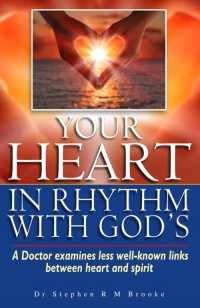John Cheek looks at Dr Stephen Brooke's book on the spiritual dimensions of the human heart

In society, so much of our language and our thoughts actually centre around the heart. Phrases like "In my heart of hearts" trip off the tongue. We're told to "trust your heart" and "follow your gut-instinct". Dr Stephen Brooke MA is a retired GP and counsellor and, far from taking it for granted, he argues passionately that understanding our heart, and guarding our heart, has many benefits for us - on many levels.
Brooke's book, Your Heart In Rhythm With God's (Amazon) is something of a lifetime's work and magnum opus for him. It's also the first medical book that I've found to be a relatively easy read. It's no new age, self-help guide at a rip-off price though. Instead, the book gives deeper insight into his aim (as those who know him already know) to find a genuine integration of body, mind and spirit.
Dr Brooke begins by explaining that the heart is so much more than just a pump in our body while emphasising the enormous durability of this extraordinary organ - how it beats around three million times each month, shows few signs of fatigue for many years and works without cleaning, repair or replacement. It starts to beat in our mother's womb before a brain has formed and doesn't need a hardwired connection to the human brain in order to keep beating - it has its own, independent, nervous system. There are other surprising and inspiring aspects to that fist-sized bundle of muscle fibres throbbing purposely and dynamically close to the centre of our chest.
Firstly, the human body appears to contain three 'brains' - one in the head, another in the heart and a third in our gut. The 'brain' in the heart, like in the gut, is made up of a network of nerve cells. This 'brain' in the heart, according to researchers at the HeartMath Institute in California, perceives, learns, remembers, feels, responds, resonates, thinks and speaks. Therefore, when we say something like, "I'm speaking from the heart, here", there's more truth in that than we might realise.

Dr Brooke describes the human heart as like a hydraulic ram that assists with sending our blood to every part of our bodies as a result of rhythmic contractions and also carries out other life-imparting functions in an efficient, elegant and even intelligent manner, suggesting that it was always intended to do so and that there are still other, delightful aspects to this organ that are waiting to be discovered by those with the scope to do so. The heart manufactures hormones which affect other organs in the body and they include various polypeptide hormones and oxytocin. Described as the "bonding hormone", oxytocin is produced in the hypothalamus within the brain and also by all four chambers of the human heart.
Oxytocin influences social bonding, cognition, sexual reproduction, childbirth and the period following childbirth along with the 'regulating' of the cardiovascular function. Dr Brooke enthuses that, here, is medical and scientific evidence that the heart is intentionally involved in the emotional and sexual areas of our lives, as well as the circulation of our blood.
If the human heart is far more complex than we realise, and not to be taken for granted, what then should our attitude be towards our own? It won't come as any surprise to learn that we can guard our hearts - both physically and emotionally. Of course, there's much that we can do to keep our heart in good health: we can undertake additional physical exercise that benefits our whole bodies, not just this organ. We can watch what we eat and the healthier we eat, the less likely we're going to put physical pressure upon it. We can try all sorts of breathing exercises that will have a healthy, regulatory effect and there are plenty of ordinary techniques that we can use.
Moreover, we can guard our hearts on an emotional level - I mentioned
earlier that the heart has a 'brain' of its own. There are strong
links between emotion, immunity and disease. Stress and the heart are
closely related. Stress affects the whole body and if our hearts can
learn to deal with stress adequately it will protect, even heal our
emotions. Our patterns of behaviour affect our heart - so let's embark
on a journey to observe and reconsider our habits and our behaviours.
Anger with hostility can lead to heart attacks, so a process of anger
management will only help us. Cynicism with hostility also leads to
stress and so instead, why not look at introducing an attitude of
optimism, rather than pessimism, to every area of our thoughts? Some
people take the power of positive thinking too far, but being
positive, rather than negative, in our attitudes will guard our hearts
- as will being more open to other people, generally. ![]()

 John Cheek is a freelance journalist currently living in Nottinghamshire.
John Cheek is a freelance journalist currently living in Nottinghamshire.






